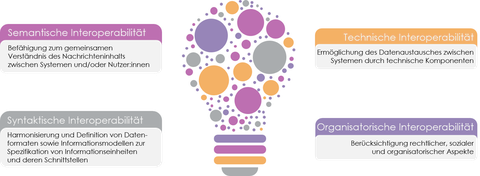AG Henke/Prochaska: Interoperabilität
Vision
Der wissenschaftliche Forschungsbereich "Interoperabilität" hat das Ziel, als Vorreiter für die nahtlose Integration von Gesundheitssystemen zu fungieren. Unsere Vision ist es, durch innovative Forschung und interdisziplinäre Zusammenarbeit eine Zukunft zu gestalten, in der Gesundheitsdaten sicher, effizient und transparent zwischen verschiedenen Systemen und Akteuren ausgetauscht werden können. Dabei sollen Gesundheitsdaten unabhängig von geografischen und institutionellen Grenzen für die Gesundheitsversorgung und Forschung zugänglich sein. Sowohl die Forschung als auch die klinische Praxis sollen von einem umfangreichen Fundus an interoperablen Daten profitieren, was zu schnelleren und fundierteren wissenschaftlichen Erkenntnissen sowie zu Innovationen in der Medizin führt.
Unser Ziel ist es, die semantischen, syntaktischen, technologischen und organisatorischen Grundlagen zu schaffen, die für eine umfassende Interoperabilität im Gesundheitswesen erforderlich sind. Um dieses Ziel zu erreichen arbeiten wir an:
- Entwicklung und Implementierung von Anwendungen unter Berücksichtigung anerkannter Standards
- Entwicklung von Prozessen, die die Anwendung und Berücksichtigung von Standards für den Datenaustausch im Gesundheitswesen ermöglichen.
- Weiterentwicklung international anerkannter Standards und Protokolle für den Datenaustausch im Gesundheitswesen.
- Förderung der Standardisierung von Gesundheitsdatenformaten und Schnittstellen, um die Kompatibilität zwischen verschiedenen Systemen und Anwendungen sicherzustellen.
- Forschung und Innovation
- Durchführung bahnbrechender Forschung zur Verbesserung der Interoperabilität und zur Überwindung bestehender technologischer und organisatorischer Hürden.
- Entwicklung neuer Technologien und Methoden, die die Integration und Nutzung von Gesundheitsdaten erleichtern und verbessern.
- Förderung der Zusammenarbeit
- Aufbau und Pflege von Partnerschaften mit Gesundheitsorganisationen, Technologieanbietern, Forschungseinrichtungen und Regulierungsbehörden auf nationaler und internationaler Ebene.
- Etablierung eines Netzwerks von Experten und Organisationen auf nationaler und internationaler Ebene, die gemeinsam an der Verbesserung der Interoperabilität im Gesundheitswesen arbeiten.
- Förderung des Wissensaustauschs und der Zusammenarbeit zwischen verschiedenen Akteuren im Gesundheitswesen, um gemeinsame Lösungen zu entwickeln und umzusetzen.
Forschungsschwerpunkte
- Transformation nationaler Standards und Terminologien in internationale Formate
- Konzeption und Umsetzung von ETL (Extract, Transform, Load)-Prozessen zur Überführung von Daten zwischen verschiedenen Datenmodellen, z.B. von p21 zu OMOP oder von FHIR zu OMOP.
- Aufbau und Bereitstellung technischer Infrastrukturen für die Forschung, wie z.B. der OHDSI-OMOP-Techstack oder die MiHUBx Service-Plattform
- Bewertung von Datenqualität
Ausgewählte Projekte
- DigiONE — Digital Infrastructure for Oncology in Europe
-
EyeMatics — „Behandlung“ von Augenerkrankungen mit interoperabler medizinischer Informatik
-
MiHUBx — Digitaler FortschrittsHub MiHUBx (Verbundleitung und technische Infrastruktur (AP2/3))
- OHDSI Germany - "Observational Health Data Sciences and Informatics" https://www.ohdsi-europe.org/index.php/national-nodes/germany
- PM4Onco — Personalized Medicine for Oncology
- RISK PRINCIPE — RISK Prediction for Risk-stratified INfection Control and PrEvention
Arbeitsgruppenleiterinnen
 © UKD/Michael Kretzschmar
© UKD/Michael Kretzschmar
wissenschaftliche Mitarbeiterin
NameFrau Dr. rer. medic. Elisa Henke
Eine verschlüsselte E-Mail über das SecureMail-Portal versenden (nur für TUD-externe Personen).
 © UKD/Michael Kretzschmar
© UKD/Michael Kretzschmar
wissenschaftliche Mitarbeiterin
NameFrau Dr. phil. Eveline Prochaska
Eine verschlüsselte E-Mail über das SecureMail-Portal versenden (nur für TUD-externe Personen).


